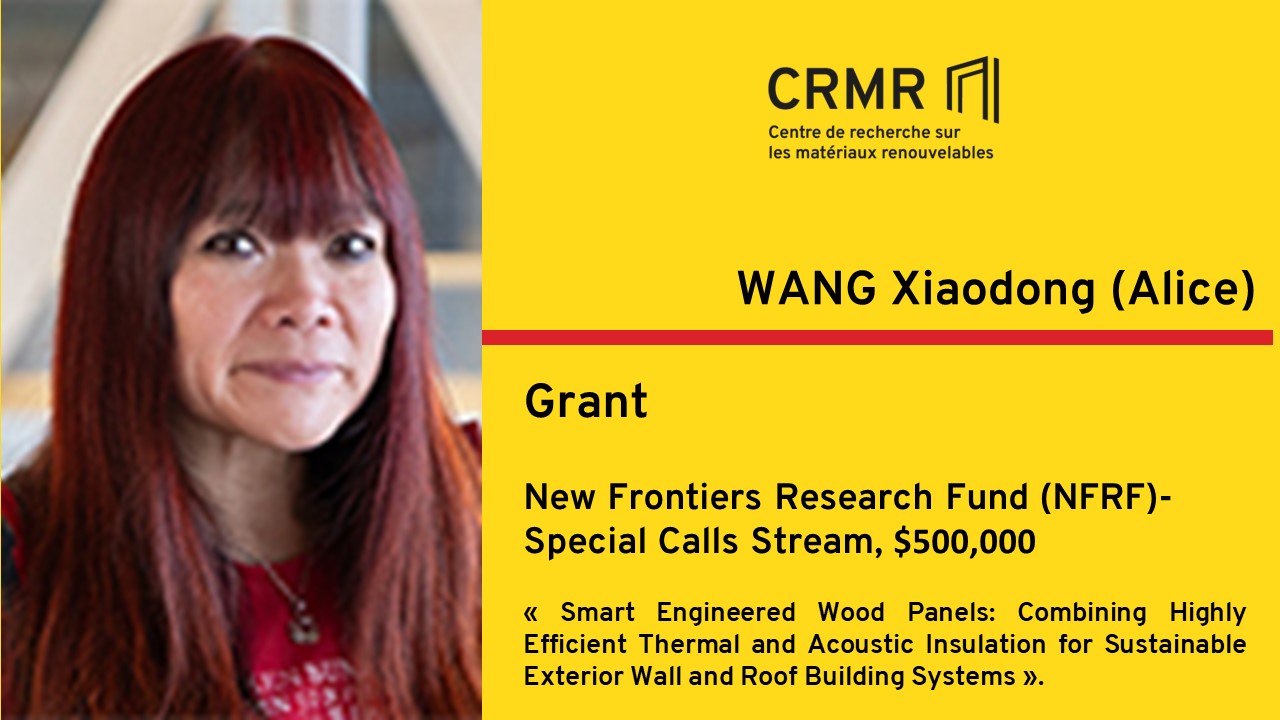Congratulations to WANG Xiaodong (Alice), recipient of the New Frontiers in Research Fund grant worth $500,000!
Congratulations to WANG Xiaodong (Alice), professor in the Faculty of Forestry, Geography and Geomatics (FFGG) at Laval University and member of the Renewable Materials Research Centre (CRMR), who has been awarded a grant from the New Frontiers Research Fund (NFRF)-Special Calls Stream, as principal investigator in a multidisciplinary project on « Smart Engineered Wood Panels: Combining Highly Efficient Thermal and Acoustic Insulation for Sustainable Exterior Wall and Roof Building Systems ».
This project will receive funding of $500,000 over three years (2023-2026).
The New Frontiers in Research Fund (NFRF) supports world-leading interdisciplinary, international, high-risk / high-reward, transformative and rapid-response Canadian-led research. NFRF special calls support research that targets emerging areas and aligns with the fund’s overall objectives. Intelligent engineered wood panels could offer significant advantages in thermal and acoustic insulation, contributing to the design of more sustainable and energy-efficient building systems.

PROJECT DETAILS
Project title: Smart Engineered Wood Panels: Combining Highly Efficient Thermal and Acoustic Insulation for Sustainable Exterior Wall and Roof Building Systems.
Objectives:
This project meets many needs and challenges:
- The wood composite panel industry needs new and better products to meet market demands;
- Cities with high population densities require buildings with good thermal and acoustic insulations to protect their occupants from high and low temperatures, as well noise;
- New climate-resilient building materials will respond to high temperature changes (day vs. night), as well as throughout the year (summer vs. winter) to achieve net zero energy buildings.
This project includes the following activities:
- Development of new materials and technologies of engineered wood panels for the envelope of smart buildings having increased energy and acoustic performances;
- Characterization and modeling of these new materials as components of a complex building envelope system;
- Evaluation of their performance via laboratory and on-site tests;
- Life cycle assessment and techno-economic analysis;
- Cost/performance optimization for different geographical/economic markets.
Team
This project will rely on the participation of a multidisciplinary team:
Research team:
- Wang Xiaodong (Alice) (principal researcher), CRMR, UL
- Qingshi Tu, University of British Columbia
- Hao Bai, University of Science and Technology Beijing
- Alireza Kaboorani, Red River College Polytechnic
- Denis Rodrigue, CRMR, UL
- Afonso Macheca, Eduardo Mondlane University
- Cheng Qian, FPInnovations
- Mattias Vesterlund, RISE Research Institutes of Sweden AB
Team of collaborators:
- Maurice Defo, NRCC
- Louis Gosselin, UL
Financial partners :
- New Frontiers in Research Fund (NFRF)
Recruitment of highly qualified personnel (HQP)
The project will also recruit four master’s students and six doctoral students.
Project Summary
The current and future environmental challenges of sustainable buildings require the development of new and highly efficient materials and processing technologies. To answer these issues, the main objective of this project is to advance our understanding on the overall properties of biobased materials for a better building envelopes design.
In this project, smart engineered wood panels with high thermal and sound insulation performances will be developed for exterior walls and roofs. These multifunctional panels will store and release heat when necessary, leading to substantial reduction in cooling and heating loads of building. Furthermore, the outstanding sound insulation property of the panels will help architects and engineers to achieve acoustic comfort for the inhabitants.
The final products will not only significantly improve energy efficiency and acoustic comfort, but also would be available at an affordable cost to populations in need. The potential economic and social benefits of using biobased materials in buildings will lead to low-carbon emission technologies which represents a great opportunity for Canada and the rest of the world.
This key partnership with Mozambican community reflects a specific focus on the needs of people being left behind. This project meets the UN research priority 2 – Social protection and basic services by optimizing access to shelters including those living in poor and densely populated areas.

